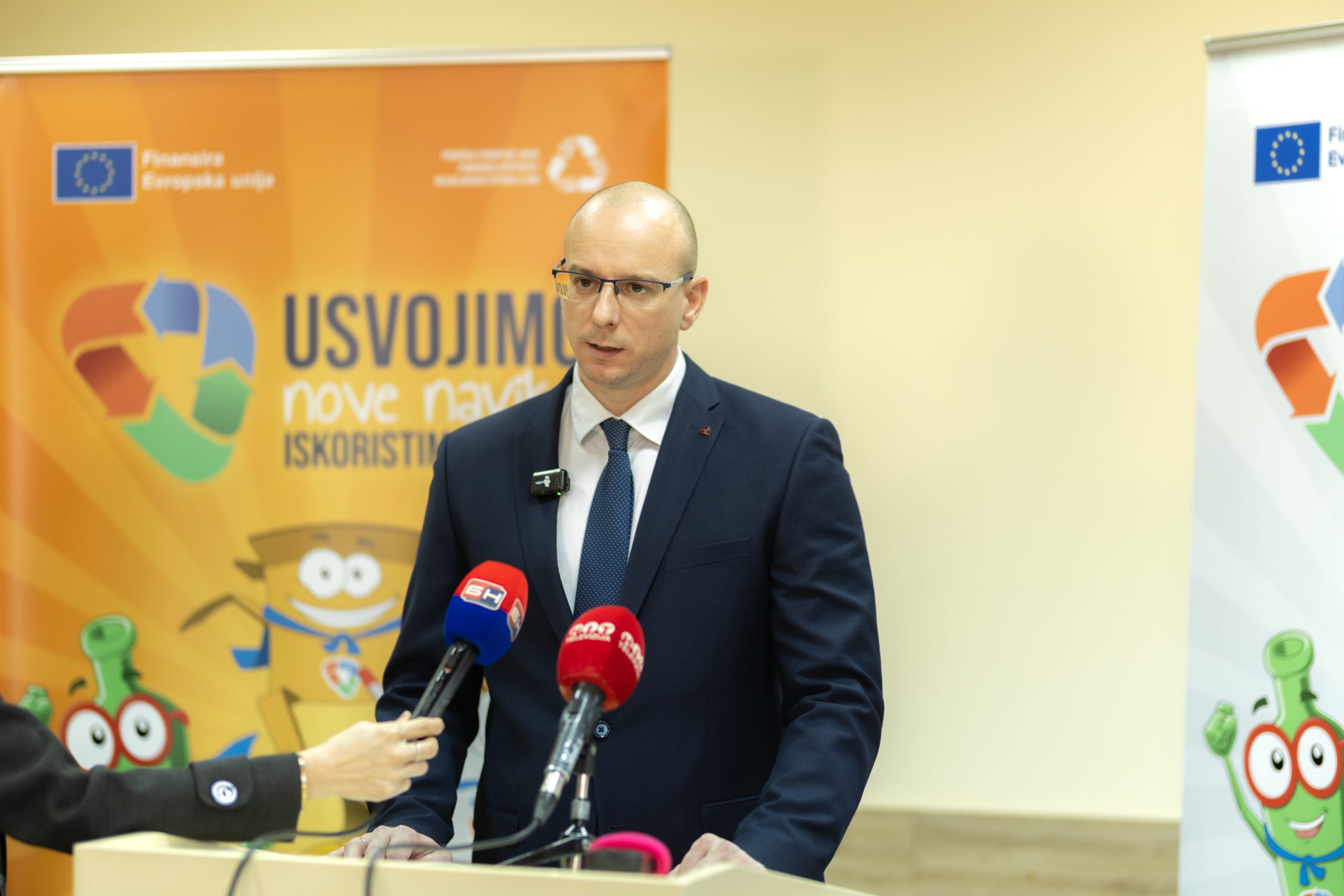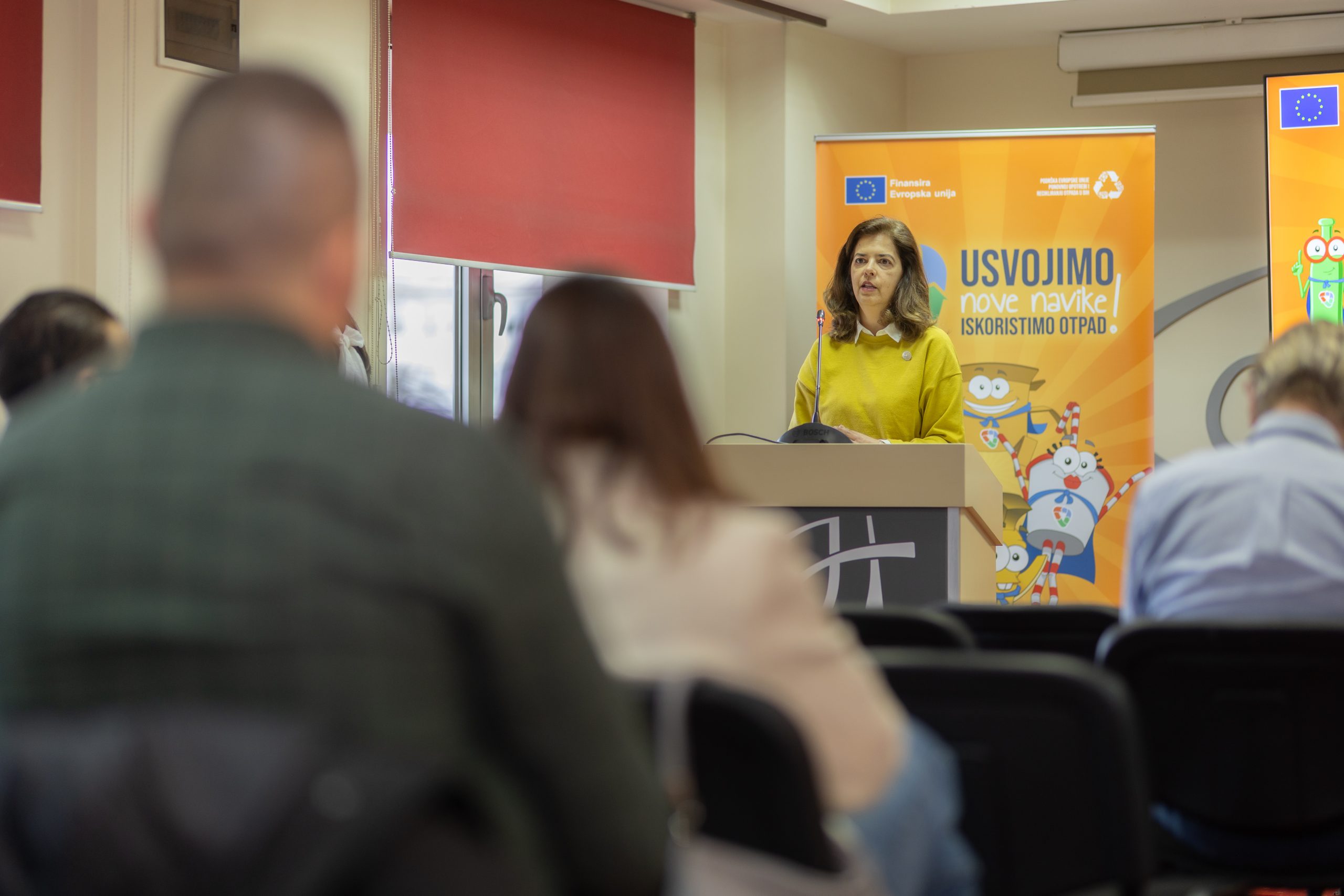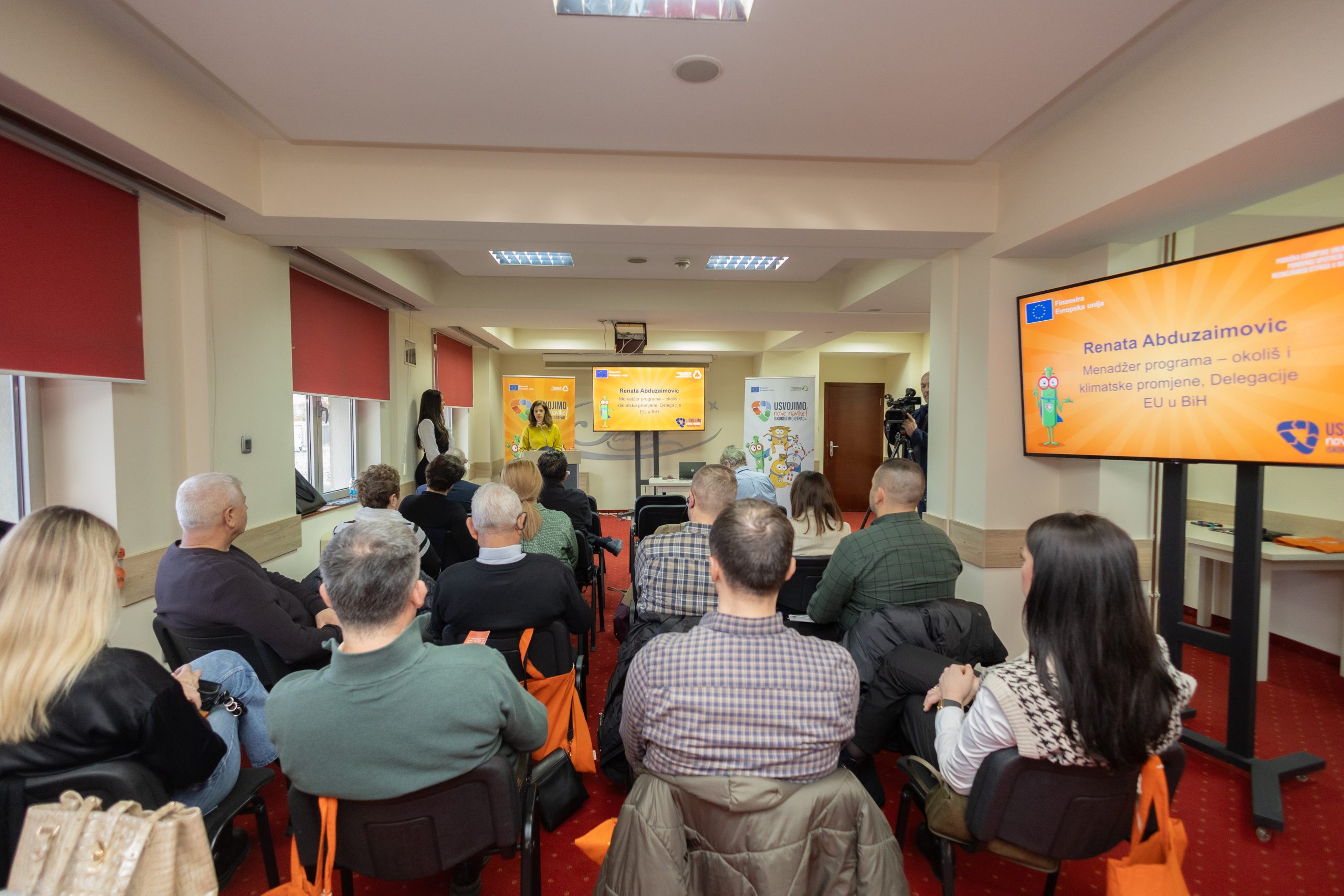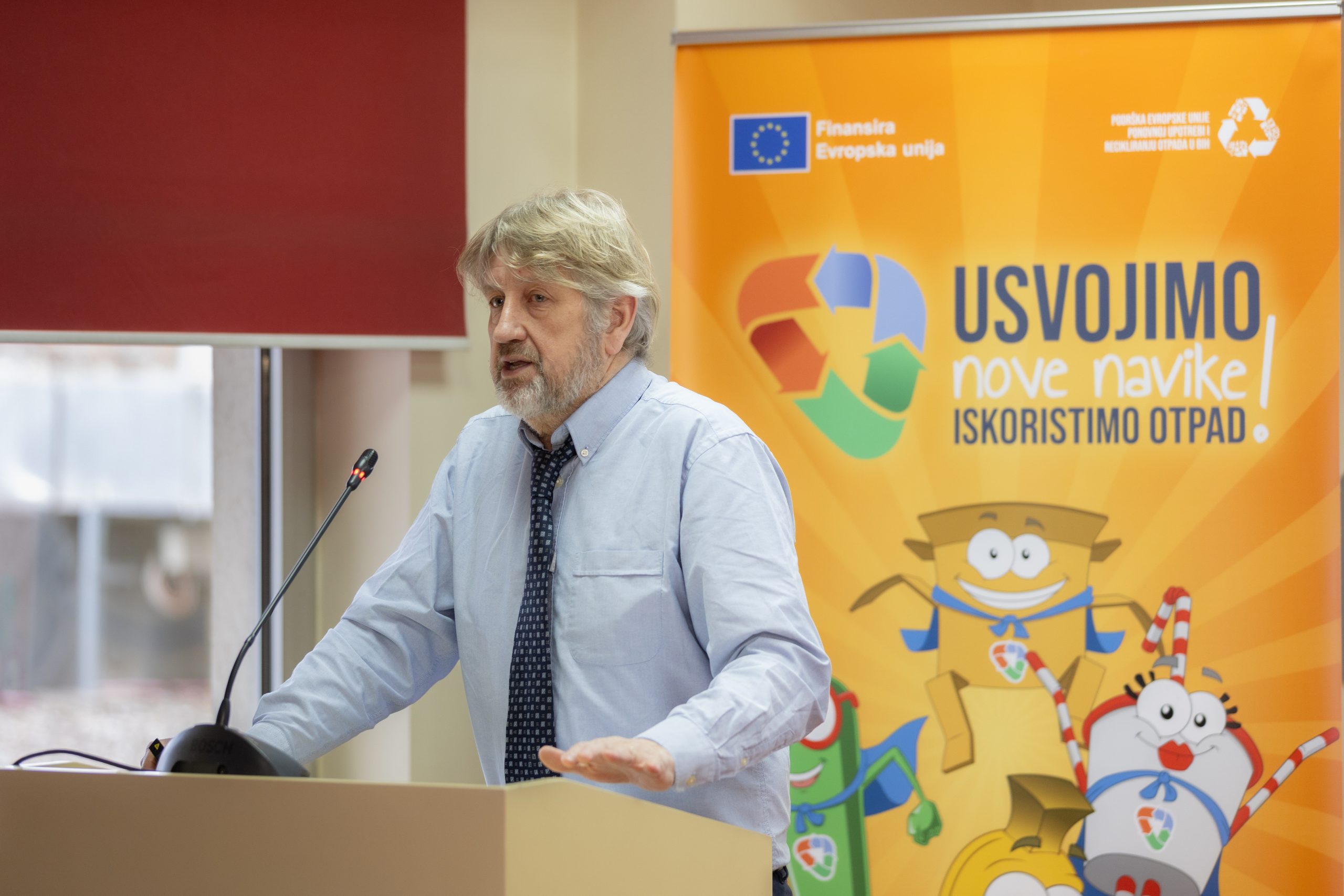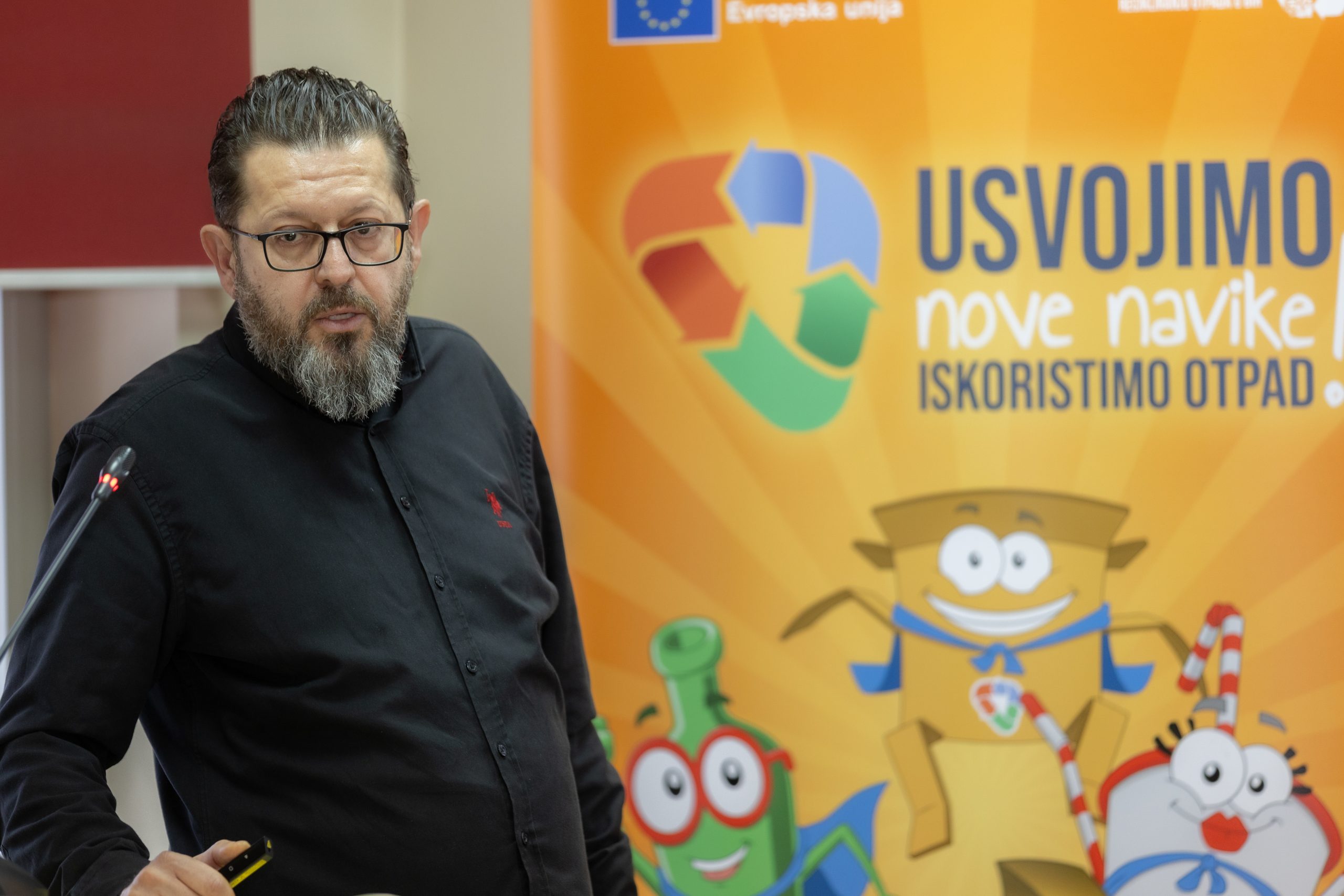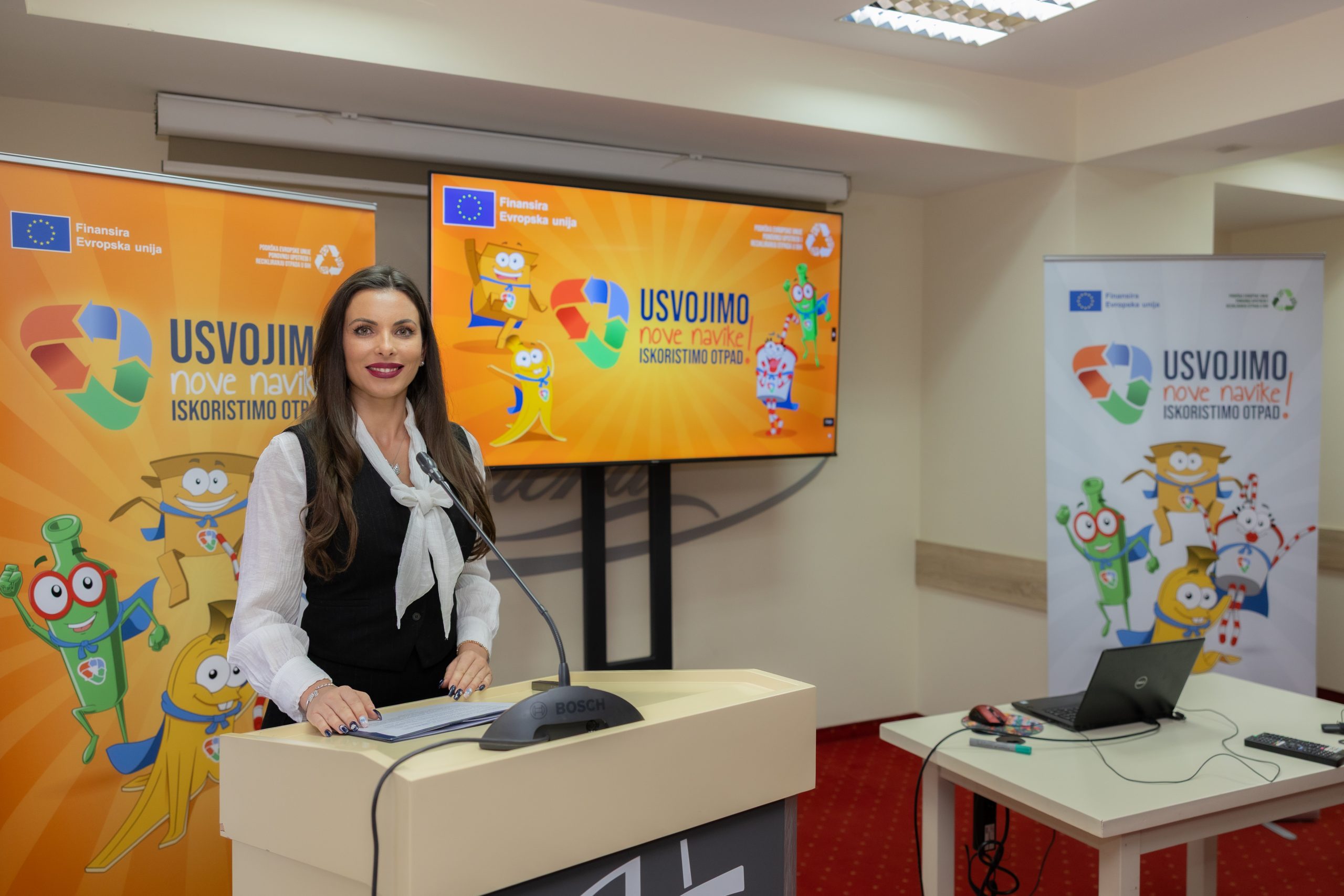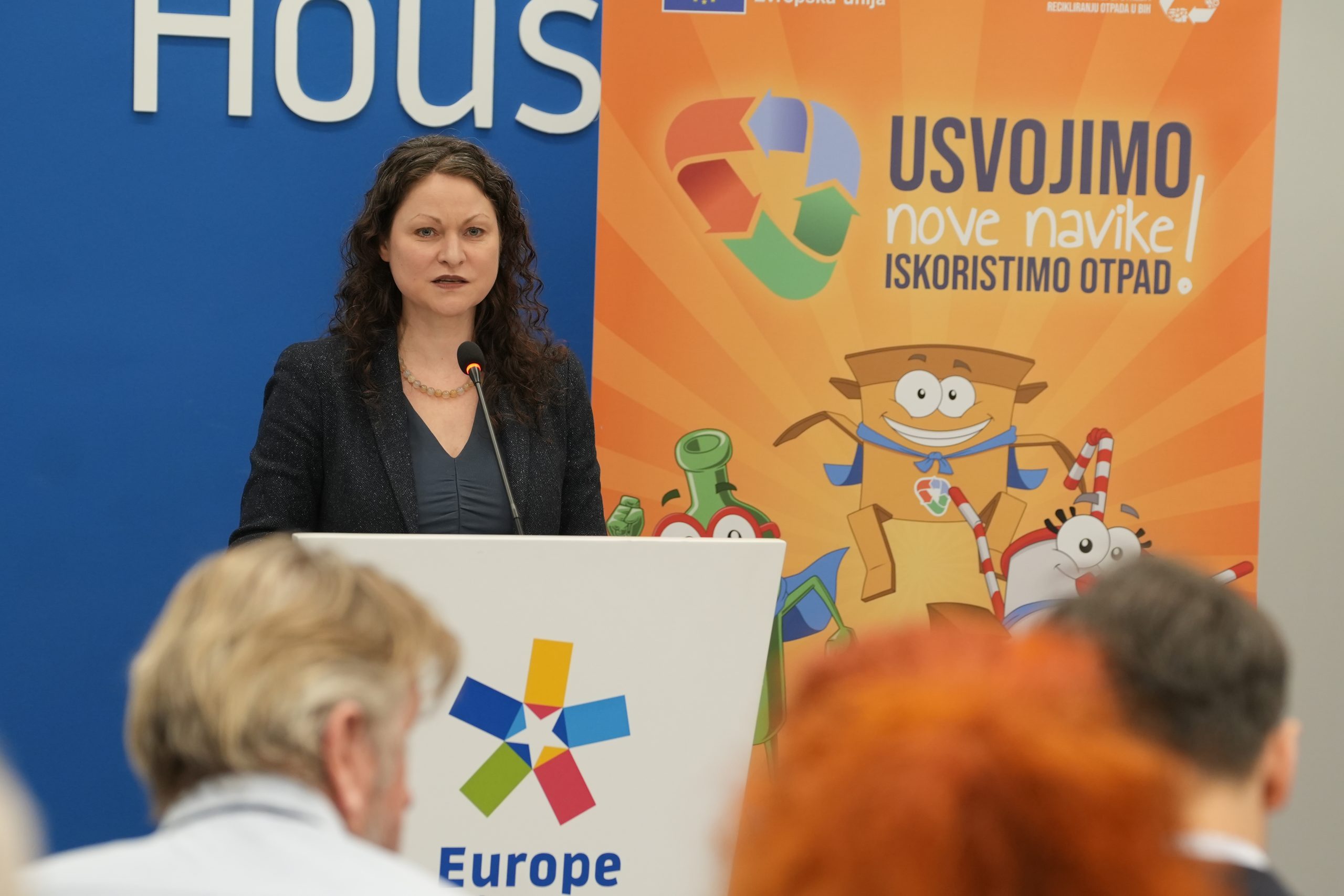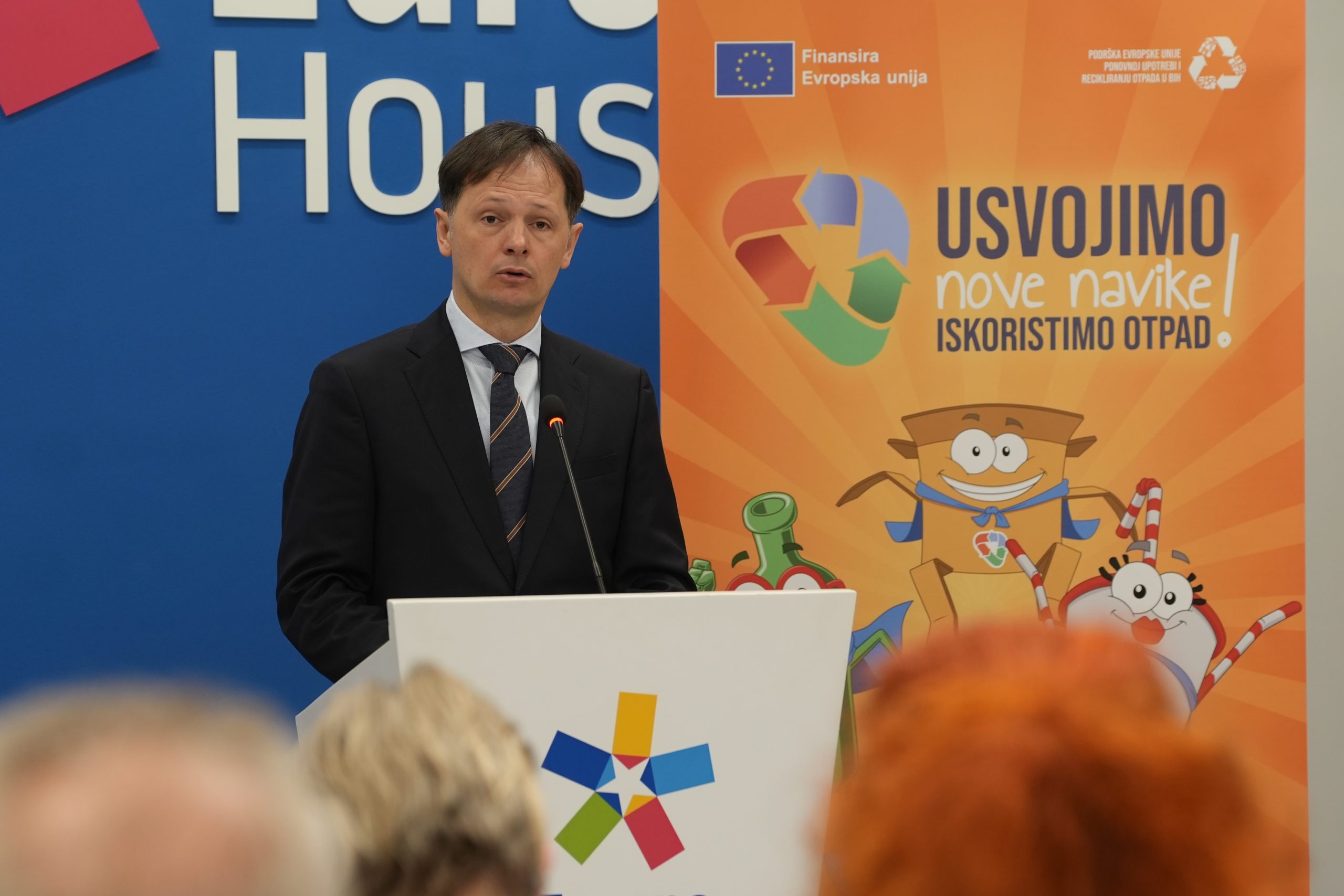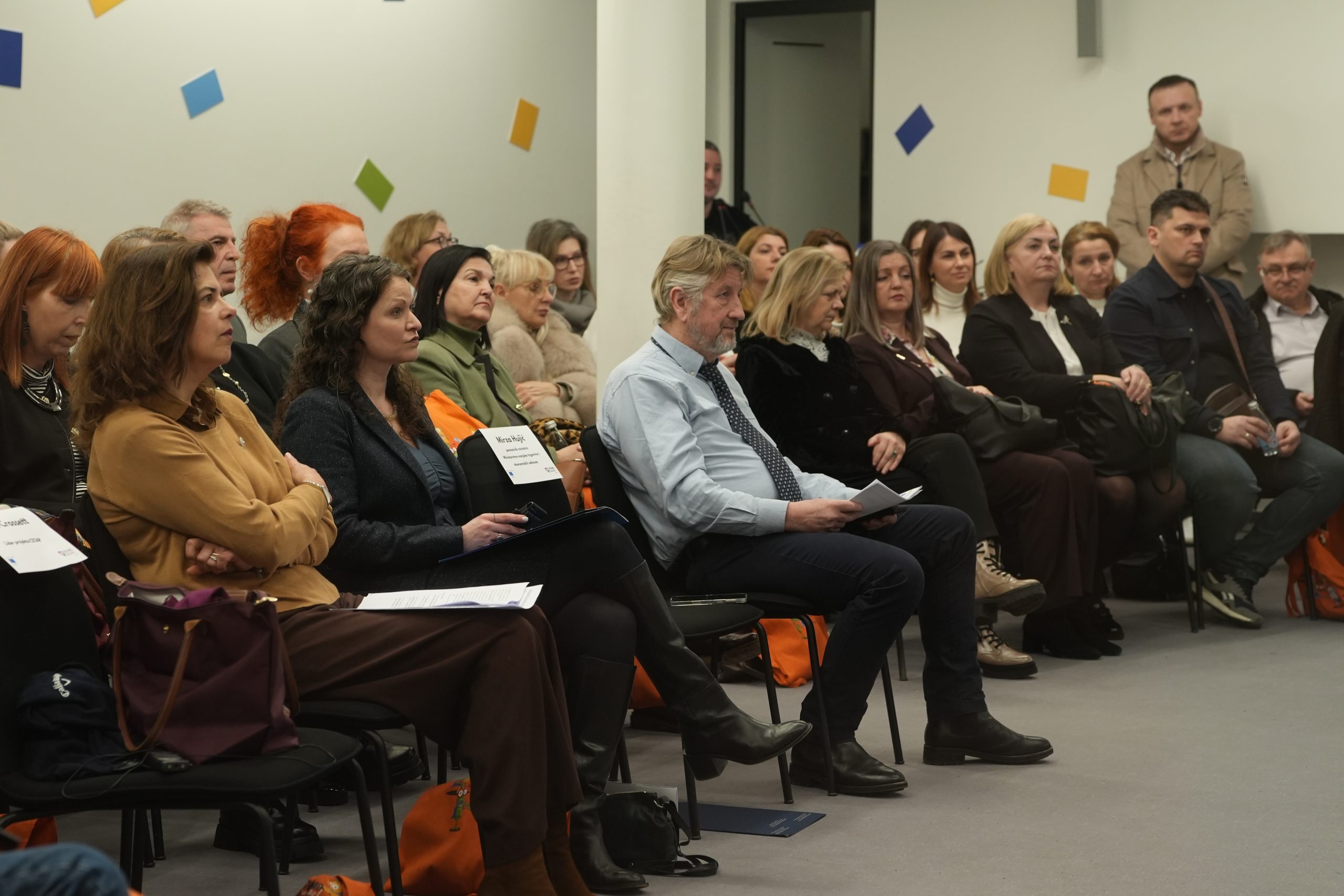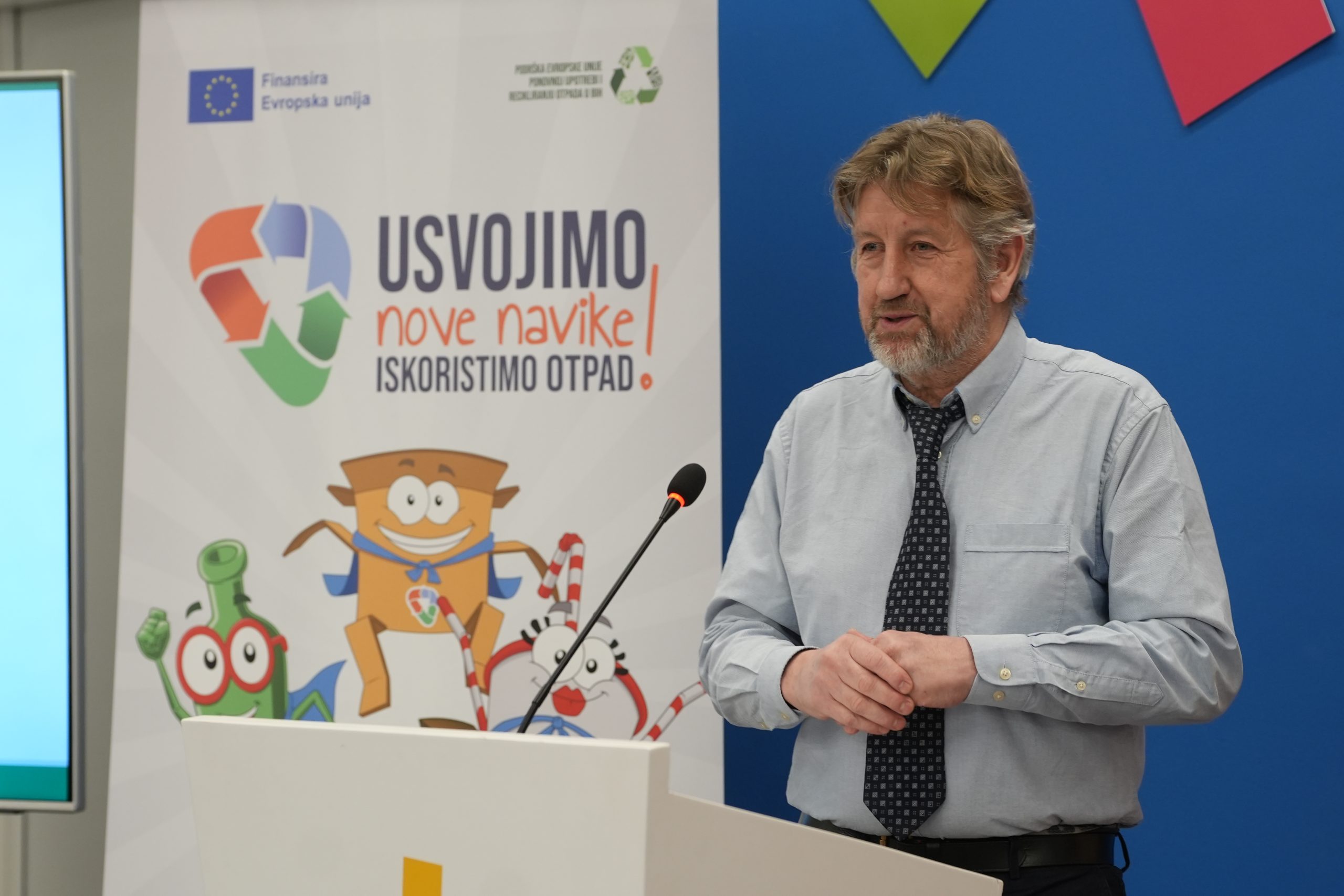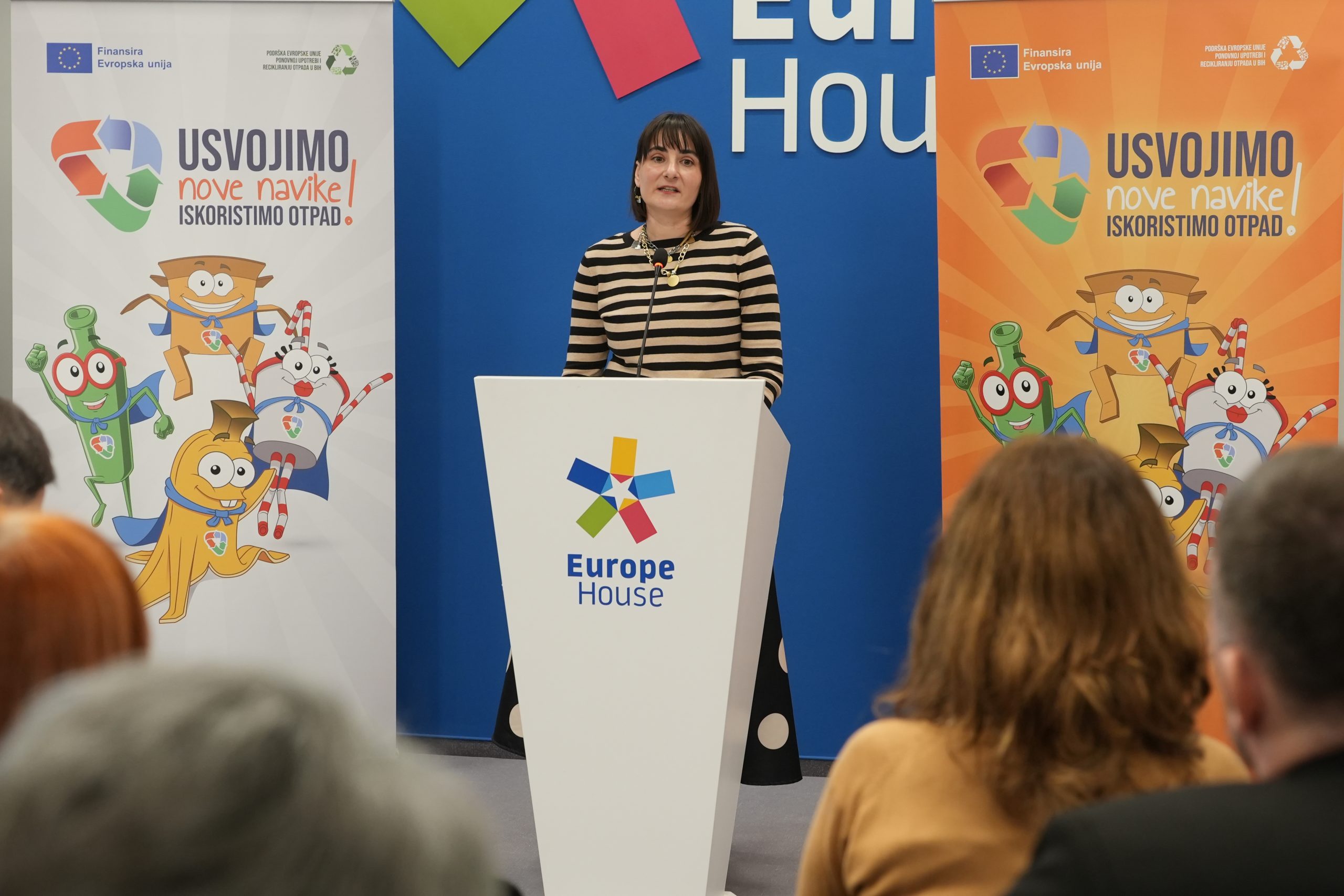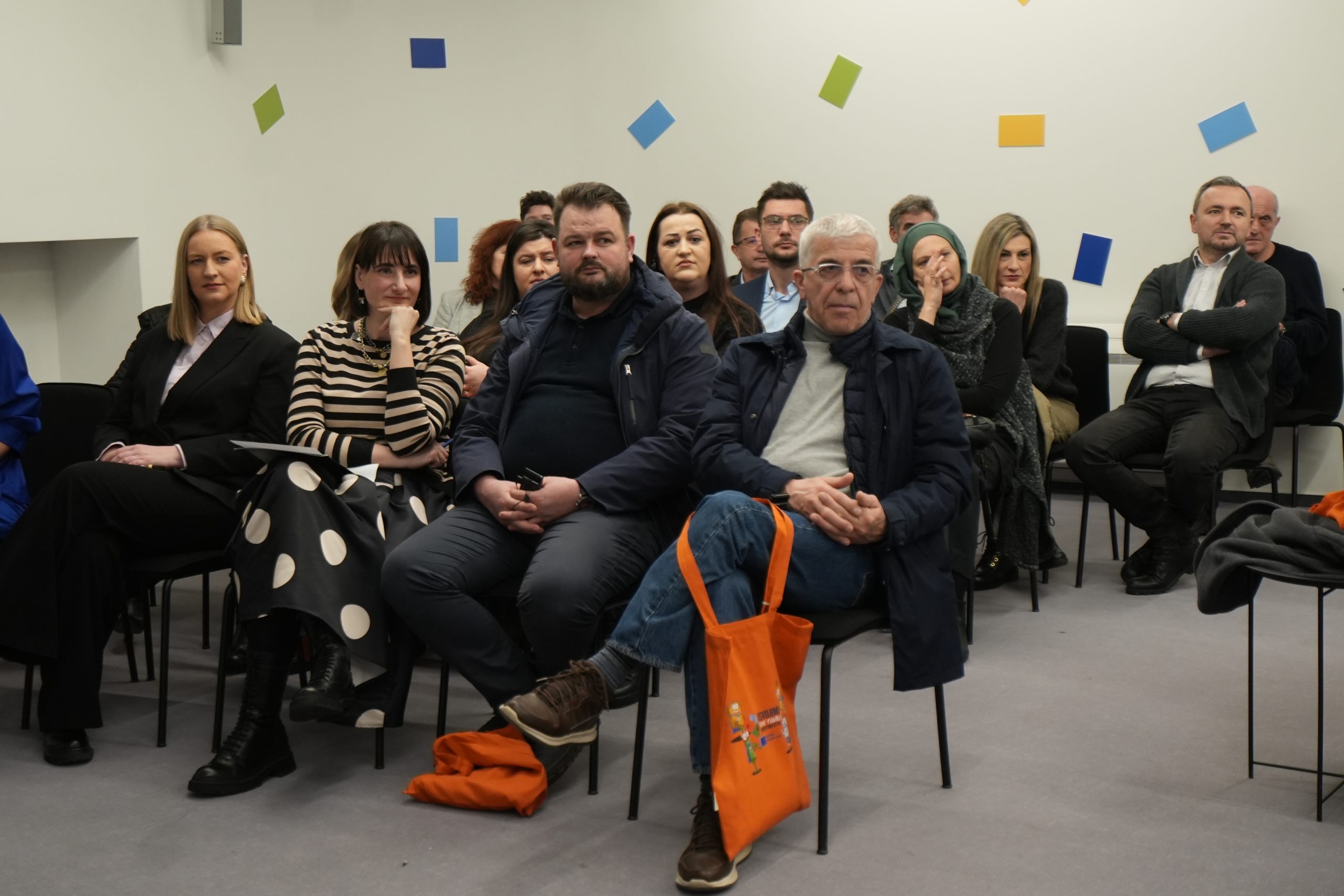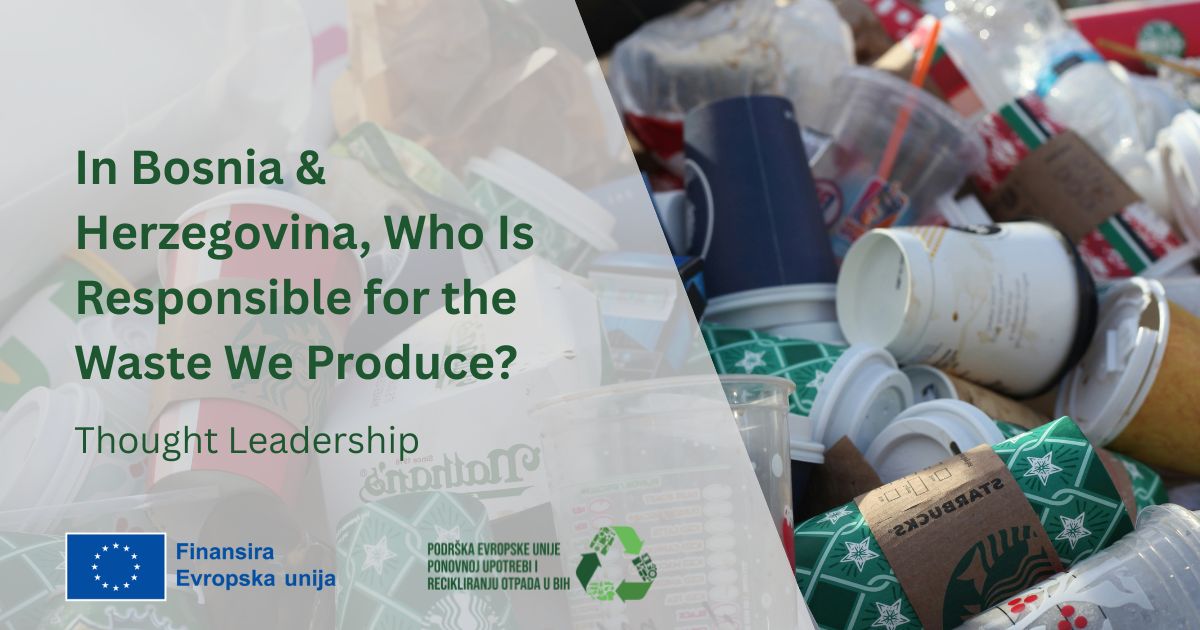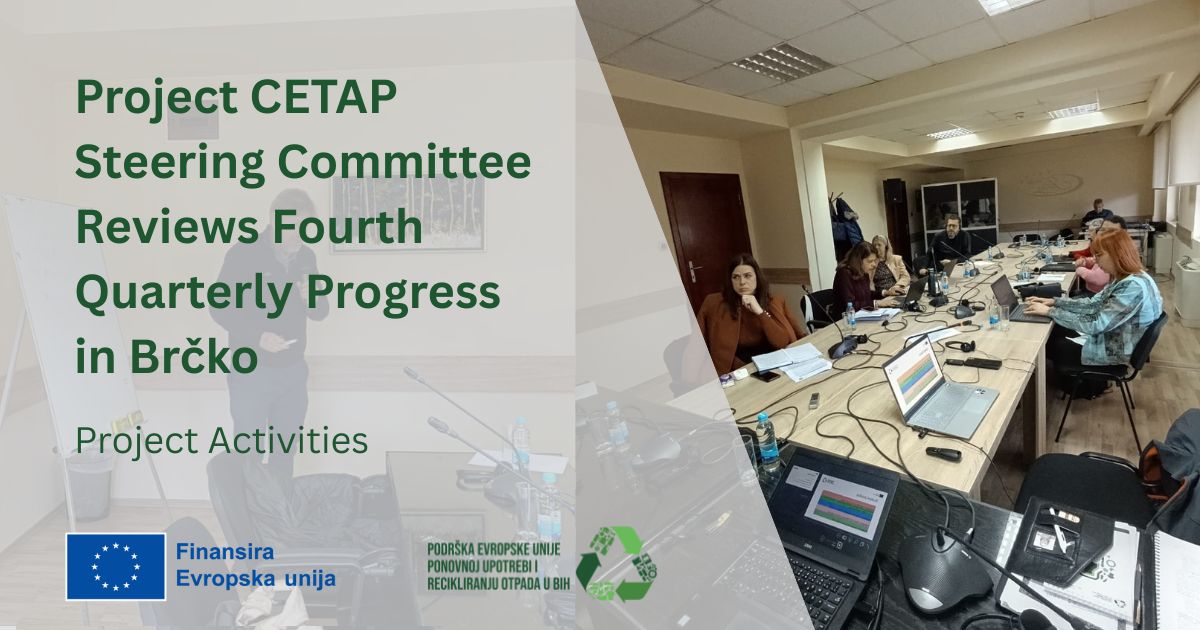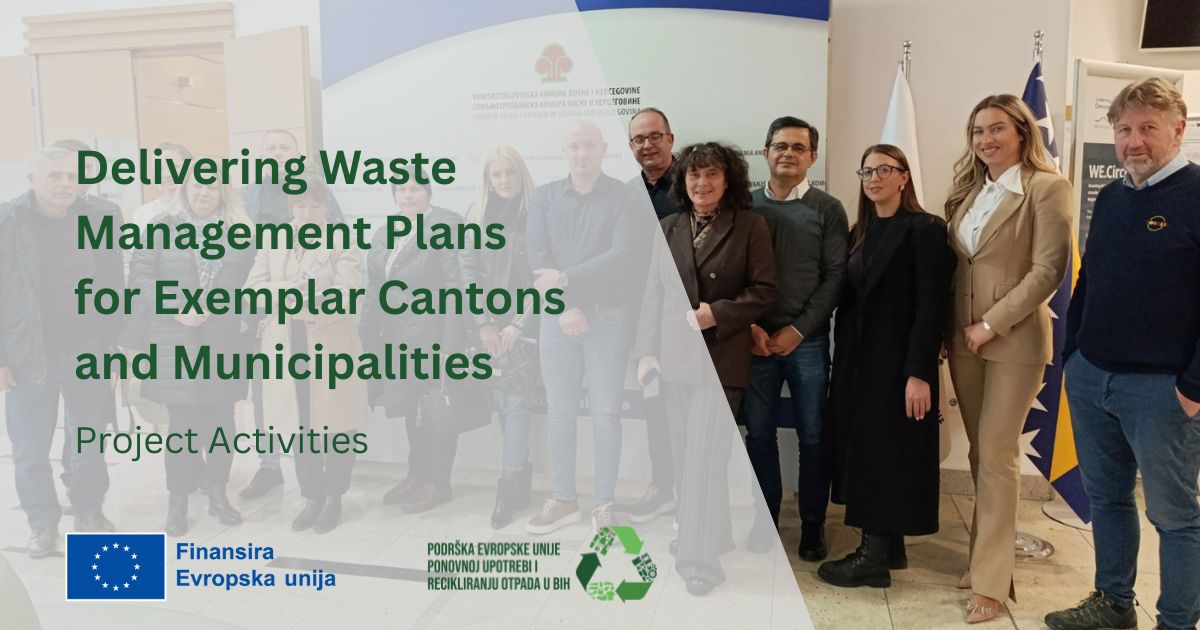Public Awareness Campaign Launch Event - Brčko
EU launches a nationwide public awareness campaign on sustainable waste management across Bosnia and Herzegovina - “Let’s adopt new habits! Let’s use waste!”
Brčko, 28 January 2026 – The public awareness campaign in Bosnia and Herzegovina entitled “Let’s adopt new habits! Let’s use waste!”, financed by the European Union, has officially been launched today in Brčko at Hotel Jelena. The event brought together representatives of key sector institutions, relevant stakeholders and representatives of the European Union in Bosnia and Herzegovina, who jointly expressed their support for the campaign and reaffirmed their commitment to improving sustainable waste management in Bosnia and Herzegovina. The campaign hosted it’s first promotional event in Sarajevo on 26 January 2026, and will be followed by the final event in Banja Luka in February 2026.
During the event, the speakers emphasised the urgency of improving waste recovery through separation, reuse and recycling throughout Bosnia and Herzegovina, calling on institutions, the business sector, as well as the citizens to adopt new habits and contribute to a more sustainable waste management system.
“This campaign highlights the impact that everyday choices have on our environment, health and future. With the support of the European Union, Bosnia and Herzegovina is aligning its waste management system with EU standards and moving away from the ‘take–make–dispose’ model. The European Union remains a strong partner in this process. To date, we have invested nearly 140 million EUR in environmental protection, including waste management and environmental infrastructure. However, lasting change depends on institutions, the business sector and citizens alike – because change starts with each of us,”
said Renata Abduzaimovic, Programme Manager – environment and climate change at the Delegation of the European Union to Bosnia and Herzegovina.
The campaign is implemented within the EU-funded CETAP project and is an integral part of the European Union’s long-lasting support to Bosnia and Herzegovina in strengthening environmental protection and waste management, in line with the EU standards.
Addressing the audience, Ivan Lovrić, Head of the Department for Communal Affairs, stated:
„Today we gather to discuss one of the most important topics of our time – circular economy with reference to waste management – a circular economy is not just a concept, it is a vision of the future in which resources are not expendable, but permanent; in which waste is not the end, but the beginning of a new cycle; where innovation and responsibility go hand in hand.
Together, we can shape a future where the economy is circular and progress is sustainable. A future where every idea, every product, and every resource has a new lease on life.“
A central feature of the promotional events is the presentation of the Eco Guardians – a team of educational and friendly characters, each representing a specific waste stream. Through clear, engaging and easy-to-understand messages, the Eco Guardians demonstrate how proper waste separation gives materials a “second life”, reinforcing the message that everyday items such as paper, glass, plastic and bio-waste are not waste, but valuable resources.
The aim of the campaign is to encourage behavioural change and inspire citizens across Bosnia and Herzegovina to adopt everyday waste separation habits and to recognise waste as a valuable resource, said Edward Scott Crossett, Team Leader of the EU-funded CETAP project.
CETAP (Circular Economy Technical Assistance Project for Improving the Recovery of Materials from Waste through Separate Collection, Reuse and Recycling) is a European Union project supporting Bosnia and Herzegovina’s transition towards sustainable waste management. The project promotes the development of new markets for waste as a resource, enhances recycling capacities and municipal services, and supports the drafting of legislation aligned with the EU Waste Package. It also provides support to competent institutions in establishing sustainable systems for the collection and treatment of specific waste streams, in line with circular economy principles.
Attachments: Brand Book – overview of the campaign’s complete visual identity, campaign logo and characters. More information about the campaign and its activities is available at: www.cetap.ba
Media contact information:
Project CETAP communications team
Email: info@cetap.ba
Phone: +387 33 563 582
Public Awareness Campaign Launch Event - Sarajevo
EU launches a nationwide public awareness campaign on sustainable waste management across Bosnia and Herzegovina - “Let’s adopt new habits! Let’s use waste!”
Sarajevo, 26 January 2026 – The public awareness campaign in Bosnia and Herzegovina entitled “Let’s adopt new habits! Let’s use waste!”, financed by the European Union, has officially been launched today in Sarajevo at Europe House. The event brought together representatives of key sector institutions, relevant stakeholders and representatives of the European Union in Bosnia and Herzegovina, who jointly expressed their support for the campaign and reaffirmed their commitment to improving sustainable waste management in Bosnia and Herzegovina. The campaign will continue with a promotional event in Brčko on 28 January 2026, followed by the final event in Banja Luka in February 2026.
During the event, the speakers emphasised the urgency of improving waste recovery through separation, reuse and recycling throughout Bosnia and Herzegovina, calling on institutions, the business sector, as well as the citizens to adopt new habits and contribute to a more sustainable waste management system.
“This campaign highlights the impact that everyday choices have on our environment, health and future. With the support of the European Union, Bosnia and Herzegovina is aligning its waste management system with EU standards and moving away from the ‘take–make–dispose’ model. The European Union remains a strong partner in this process. To date, we have invested nearly 140 million EUR in environmental protection, including waste management and environmental infrastructure. However, lasting change depends on institutions, the business sector and citizens alike – because change starts with each of us,”
said Magdalena Müller-Uri, Head of Cooperation at the Delegation of the European Union to Bosnia and Herzegovina.
The campaign is implemented within the EU-funded CETAP project and is an integral part of the European Union’s long-lasting support to Bosnia and Herzegovina in strengthening environmental protection and waste management, in line with the EU standards.
Addressing the audience, Mirza Hujić, Assistant Minister at the Ministry of Foreign Trade and Economic Relations, stated: “I would like to express my sincere gratitude to the European Union for its long-standing support in the field of environmental protection, which has been ongoing for many years. Through this project and EU support for Bosnia and Herzegovina on its path towards EU integration, and in line with the European Green Deal and the principles of the circular economy, it is crucial that we further improve waste management in Bosnia and Herzegovina.”
A central feature of the promotional events is the presentation of the Eco Guardians – a team of educational and friendly characters, each representing a specific waste stream. Through clear, engaging and easy-to-understand messages, the Eco Guardians demonstrate how proper waste separation gives materials a “second life”, reinforcing the message that everyday items such as paper, glass, plastic and bio-waste are not waste, but valuable resources.
The aim of the campaign is to encourage behavioural change and inspire citizens across Bosnia and Herzegovina to adopt everyday waste separation habits and to recognise waste as a valuable resource, said Edward Scott Crossett, Team Leader of the EU-funded CETAP project.
CETAP (Circular Economy Technical Assistance Project for Improving the Recovery of Materials from Waste through Separate Collection, Reuse and Recycling) is a European Union project supporting Bosnia and Herzegovina’s transition towards sustainable waste management. The project promotes the development of new markets for waste as a resource, enhances recycling capacities and municipal services, and supports the drafting of legislation aligned with the EU Waste Package. It also provides support to competent institutions in establishing sustainable systems for the collection and treatment of specific waste streams, in line with circular economy principles.
Attachments: Brand Book – overview of the campaign’s complete visual identity, campaign logo and characters. More information about the campaign and its activities is available at: www.cetap.ba
Media contact information:
Project CETAP communications team
Email: info@cetap.ba
Phone: +387 33 563 582
In Bosnia & Herzegovina, Who Is Responsible for the Waste We Produce?
Who is responsible for the waste we produce?
As with all big questions, the answer is not simple. As consumers, we choose what we purchase and how we dispose of it; as businesses, we choose what we sell and how we sell it; while public utility companies (RADs) work within their budgets to collect, sort, and recycle waste. Governments and Local Self Government Units have the task of developing policy and legislation which will improve waste management practices.
In a circular system, waste is no longer a problem to be hidden, exported, or imported – it is a resource to be managed collectively. For Bosnia and Herzegovina, this shift does not depend on a single policy, campaign, or investment, but on the co-ordinated actions of citizens, businesses, and institutions, each playing a distinct and essential role.
When we look at waste in this context, we see that the problem is not owned by one actor alone and in fact the responsibility is shared by all. After all we are all ultimately responsible for the waste we produce as a society.
Challenges
While Waste Management Plans are being developed in line with EU standards and local legislation – which will improve what and how items can be recycled in Bosnia and Herzegovina – it is also important to consider what more can be done now.
It is essential to recognise the challenges citizens face: whether a lack of knowledge about the benefits of reducing waste in BiH; limited access to household recycling infrastructure, or low motivation to recycle because it sits low on a list of more immediate concerns.
There is no point in shying away from these challenges. Acknowledging them does not mean that citizens are powerless.
Households: Where Circularity Begins
As consumers, we can flip the question of waste responsibility on its head and ask: who is responsible for the waste we don’t produce? The biggest impact we can have on waste output is to prevent it in the first place—and that starts at home.
There is a model known as the “waste hierarchy”, which ranks waste management options according to what is best for the environment:
- Prevention
- Preparing for Re-Use
- Recycling
- Recovery
- Dispose
Often, when people think about improving their waste impact, they focus on recycling. However, within the waste hierarchy, recycling sits only in third place. Reducing and reusing are not only easier but far more impactful than recycling, recovery, or disposal. And waste prevention sits at the top of the hierarchy and delivers the greatest economic and environmental benefits.
Households are the first point at which materials either retain value or become waste. How citizens sort, store, repair, reuse, or discard products directly determines whether materials can re-enter the economy or are lost to landfill.
In Bosnia and Herzegovina, many citizens already practise informal circularity, repairing appliances, reusing packaging, and extending product life out of necessity. Yet without consistent collection systems, clear guidance, and trust that sorted waste will be treated properly, these efforts can often feel futile.
The transition requires more than telling people to “recycle better”. It requires confidence, clarity, and convenience – systems that reward participation. When citizens understand why separation matters, have the ability to recycle and can see the impact of their actions, behaviour change follows.
Businesses: From Waste Generators to Solution Providers
Businesses sit at the centre of material flows. They design products, choose packaging, manage logistics, and influence consumption patterns. In a linear model, waste is a cost. In a circular one, it becomes a strategic asset.
For companies in Bosnia and Herzegovina, circularity offers clear opportunities:
- Reduced material costs through reuse and secondary raw materials.
- New markets for repair, refurbishment, and recycling services.
- Stronger alignment with EU standards, improving export competitiveness.
As part of CETAP, a Waste Exchange Platform is being designed and developed. This platform will allow businesses across the country to sell their ‘waste’ to other organisations that can use these materials as valuable inputs and resources.
We’re also reviewing Extended Producer Responsibility (EPR) schemes which are a critical tool in this transition. They shift accountability beyond disposal and towards full product lifecycle responsibility—encouraging better design, financing collection systems, and supporting recovery infrastructure.
However, EPR works only when businesses are engaged as partners, not just payers. Transparent rules, fair enforcement, and predictable systems allow companies to invest confidently in circular solutions.
Institutions: Enabling the System to Work
Governments and public institutions hold the framework together. Their role is not to manage waste directly, but to create the conditions in which circular system for waste management can function.
In Bosnia and Herzegovina’s complex governance landscape, coordination is just as important as legislation. Aligning entity-level regulations, strengthening enforcement, supporting municipalities and cantons, and ensuring data transparency are all essential steps.
Equally important is public trust. When citizens and businesses believe institutions are capable, consistent, and fair, participation increases. Circular economy policies succeed not through control, but through credibility.
Institutions also play a crucial role in enabling investment—using economic instruments, incentives, and funding mechanisms to unlock private-sector participation and modernise infrastructure.
Shared Responsibility, Shared Benefit
A circular economy challenges the idea that responsibility for waste management can be isolated. No single actor can deliver change alone.
- Households cannot separate waste if systems fail them.
- Businesses cannot invest if rules are unclear or unevenly applied.
- Institutions cannot enforce circularity without public and private buy-in.
But when these roles align, momentum builds quickly.
Bosnia and Herzegovina has strong foundations for this shared approach: deep-rooted community values, a growing private sector, and increasing alignment with European Union policy frameworks. What is needed now is a collective shift in mindset—from “who is to blame?” to “how do we act together?”
A Circular Future Is a Collective Choice
Responsibility for waste is not about pointing fingers; it is about recognising inter-dependence.
Every sorted bottle, every redesigned product, and every aligned policy decision contributes to a system where materials retain value and waste loses meaning. Circularity is not imposed—it is co-created.
CETAP exists to support this shared journey: strengthening policy, engaging institutions, supporting businesses, and building public awareness so that Bosnia and Herzegovina can move from fragmented responsibility to shared solutions.
Because the circular transition will not be delivered by one actor alone—but by all of us.
Project CETAP Steering Committee Reviews Fourth Quarterly Progress in Brčko
Project CETAP held its fifth Project Steering Committee (PSC) meeting on 9 December 2025 at Hotel Jelena in Brčko, marking another key milestone in the project’s delivery. The meeting focused on reviewing progress achieved during the fourth reporting period and agreeing priorities for the coming months ahead.
The meeting was formally opened by Mr E. Scott Crossett, the Project Team Leader, and was attended by members of the CETAP team as well as PSC members and observers, including representatives from EU institutions, state and entity ministries, and the Brčko District.
Review of Progress and Reporting Period Activities
The Steering Committee reviewed the productive progress made during the reporting period 1 September – 30 November 2025, including findings from Results-Oriented Monitoring (ROM), and discussed planned activities for 1 December 2025 – 28 February 2026.
A central item was the Draft Study Report, which provides a comprehensive analysis of policy and regulatory frameworks, market analysis, priority waste streams, Extended Producer Responsibility (EPR) schemes, technological innovation, financial and stakeholder assessments, and opportunities to treat waste as a resource. Practical examples, such as container glass, are included to illustrate market potential.
Legislative Alignment and Compliance Work
Significant progress has been made on legislative alignment with the EU waste acquis. The Project Team has reviewed the Draft Law on Waste Management of the Federation of BiH and prepared targeted recommendations to strengthen alignment with EU requirements.
Compliance Tables have been completed for all relevant administrative bodies under the Waste Framework Directive (2008/98/EC). Work is ongoing for the Packaging and Packaging Waste Regulation (EU) 2024/1781 and the WEEE Directive (2012/19/EU), with all remaining compliance work expected to be finalised in the first half of 2026.
Strategic Planning and Local-Level Engagement
A draft content outline has been developed for the Strategic Planning Guideline and Waste Management Plans. As part of this work, workshops with municipalities in Republika Srpska have commenced and work is progressing with 17 exemplar municipalities in total under the programme running through June 2026.
In the Federation of Bosnia and Herzegovina, meetings have been held with selected exemplar cantons, which have submitted formal requests for technical assistance. These cantons are at varying stages of readiness: some require only a review of existing plans, others need updates aligned with planned investments or feasibility studies, while some will require full waste management plans developed from the ground up.
Platforms for Cooperation and Waste Commerce
The Project Steering Committee reviewed progress on the development of both the multi-stakeholder platform and the waste exchange platform.
Meetings have been held with the Chambers of Commerce in the Federation of BiH, Republika Srpska, and Brčko District. While the FBiH and RS chambers already operate suitable digital platforms, the Brčko District chamber will require minor upgrades to meet security standards—support that will be provided by the project. Long-term sustainability was emphasised, with chambers expected to assume responsibility for administration and membership-based financing after project completion.
For the waste exchange platform, both Entity Environment Funds have agreed to host the system within their existing waste information infrastructures, ensuring consistency with EU reporting and data requirements.
Pilot Actions and Public Awareness
During this reporting period, the project delivered three key outputs supporting pilot actions for waste recovery and recycling:
- A waste-category screening report
- A framework for selecting bankable projects
- Project fiches for identified pilot investments
The Project Team is also reviewing data on collected and treated volumes of selected waste streams in close coordination with municipalities and councils. Work continues on EPR schemes and management systems for priority waste streams, including options related to end-of-waste status, glass, and PET.
Progress was also presented on the public awareness campaign, for which the campaign strategy has now been approved. Preparations are underway for launch events scheduled for January 2026.
Mr Crossett closed the meeting by thanking all participants for their continued engagement and constructive contributions. The meeting formally concluded at 15:00.
Delivering Waste Management Plans for Exemplar Cantons and Municipalities



Project CETAP is in the process of providing specific technical assistance to support policy development that will favour a circular economy, by promoting and enabling re-use and recycling.
Alongside this the team are supporting further harmonization of the existing country-wide legislation and once completed this will result in an upgraded legal framework governing the waste management - further aligning local entity legislation with the EU Waste Package.
In addition, the agreed scenarios proposed by the Study on Market Potential for the application of circular economy principles in the management of special categories of waste in BiH should be transferred into the municipal and cantonal plans.
The project team will use all of this information to prepare guidelines for strategic planning in the waste sector for cantons and municipalities, and will also develop municipal and cantonal plans for circular special waste management for a specified group of exemplar local government units.
In November the project team developed draft contents for the guideline on strategic planning. This will be presented within the 4th Progress report dated 30th November 2025. The guideline will be prepared during the second quarter of 2026 and the completion of the guidelines will coincide with the delivery of the second series of trainings and stakeholder capacity building.
Also in November the project team had two induction workshops for the exemplar municipalities in Republika Srpska. The events were held in Banja Luka and Sarajevo and were well attend by the exemplar municipalities.
At the workshops the project team discussed the expected outputs and working modalities with the delegates.
The hope now is to have two sessions a month from January 2026 with another one-to-one session planned with the CETAP waste planning expert team for the Republika Srpska in early December 2025.
In terms of waste management planning activities in the Federation, the project team have made agreements with Sarajavo Canton; Herzegovina Neretva Canton; and are awaiting formal agreement from Central Bosnia Canton and Zenica Doboj Canton on specific work activities in those territories. A work plan for these Cantons and associated municipalities is being submitted with the 4th Progress report dated 30th November 2025.
The CETAP Team would like to thank all of our exemplar municipalities and cantons who have are working with us to enable this transition.
Finding Gold in Your Electronic Waste: Turning a Hidden Problem into a Circular Opportunity
Project CETAP — European Week for Waste Reduction (EWWR)
Every year, households and businesses across Bosnia and Herzegovina quietly accumulate a growing mountain of old phones, broken chargers, forgotten laptops, unused cables, damaged hairdryers, and discarded televisions. We rarely think of these items once they stop working—but within this overlooked waste stream lies something far more valuable than most people imagine.
Waste from Electrical and Electronic Equipment (WEEE) also known as electronic waste or e-waste is one of the fastest-growing waste streams globally, and also one of the most resource-rich. Inside even a small mobile phone, you will find tiny but valuable quantities of rare earth elements such as gold, silver, palladium, copper, lithium. These materials are essential for technology, renewable energy systems, electric vehicles, and many sectors that underpin a modern economy.
Yet in Bosnia and Herzegovina—like in many parts of Europe—a significant portion of WEEE never reaches official collection points. Instead, it sits in drawers, is thrown into mixed waste bins, or is handled informally, leading to environmental harm and lost economic potential.
As part of the European Week for Waste Reduction (EWWR), Project CETAP is shining a spotlight on the hidden value in our electronic waste, and how we can unlock it through better habits, stronger systems, and a shift towards a circular economy.
Why is WEEE so important for a circular economy?
Moving from a linear “take–make–dispose” model to a circular system means keeping materials in use for as long as possible. WEEE is one of the clearest examples of why this shift matters.
- Valuable materials are being thrown away
Many electronic devices contain precious metals with surprisingly high market value. For example:
- 1 tonne of used mobile phones contains significantly more gold than 1 tonne of gold ore. 1 ton of ore gets 1g of gold. But you can get the same amount of gold from recycling just 41 mobile phones.
- Recycling aluminium uses 95% less energy than producing new aluminium.
- Copper, lithium, and rare earth elements are essential for green technologies—yet most remain unrecovered.
When WEEE is lost to landfill, these materials must be mined again, contributing to environmental damage, resource depletion, and carbon emissions.
- Improper disposal harms human health and the environment
Electronics contain hazardous substances such as lead, mercury, cadmium, flame retardants, and chemicals that—when not handled properly—can contaminate soil, water, and air. Informal burning or dismantling poses serious risks to communities.
- Recovering materials creates economic opportunities
A well-functioning WEEE collection and recycling system:
- Creates skilled green jobs
- Reduces the need for imported raw materials
- Supports domestic recycling industries
- Helps municipalities comply with EU Waste Package requirements
For Bosnia and Herzegovina, this is not just an environmental issue—it is an economic opportunity.
EWWR: Small actions, big impact
The European Week for Waste Reduction (EWWR) encourages individuals, schools, companies, and institutions across Europe to reduce waste, reuse materials, and improve recycling behaviours. This year’s theme highlights the importance of giving products a new life and preventing valuable resources from being lost.
Project CETAP is contributing to EWWR by raising awareness of the hidden value in WEEE and encouraging citizens to adopt simple, practical habits.
Five actions you can take today
Small steps that help Bosnia and Herzegovina build a circular future.
- Empty your “tech drawer”
We all have one—a drawer full of old phones, USB sticks, remote controls, chargers, or random cables. Clearing it out is the easiest way to start.
- Bring unusable electronics to official collection points
Never place WEEE in the household bin. Approved collection points ensure safe handling and proper recycling. ZEOS is a non-profit in BiH which has collection points all across the country for WEEE, you can find a map of all their recycling points here: https://www.zeos.ba/en/43/pages/21/map-with-containers
- Donate functional devices
Old but working laptops, tablets, and phones can be refurbished and reused by schools, charities, and low-income families.
- Repair instead of replace
Many devices can be fixed cheaply. Repairing extends their life, reduces waste, and supports local repair businesses.
- Choose greener electronics
Look for devices that use recycled materials, have replaceable components, or come with long warranties.
How Project CETAP supports the transition
As Bosnia and Herzegovina works towards EU alignment and a modern circular economy WEEE is a key focus area within Project CETAP. Our work includes:
- Analysing the potential for improved management of special waste streams, including WEEE
- Supporting harmonisation with the EU Waste Package
- Raising national awareness on correct waste handling and circular behaviours
- Engaging municipalities, schools, private sector partners, and citizens
- Delivering a nationwide public awareness campaign launching January 2026
By strengthening systems and educating the public, CETAP helps turn what is currently a waste challenge into an opportunity for sustainable growth.
There is gold in your waste—let’s not throw it away
WEEE is often seen as a burden, but in reality it is one of our most valuable secondary resources. Every old phone, broken toaster, or unused cable contains materials that can be recovered and transformed into something new.
During EWWR, and throughout the months ahead, Project CETAP invites everyone in Bosnia and Herzegovina to take action. Together, we can reduce environmental impact, support a more resource-efficient economy, and unlock the hidden value in the devices we no longer use.
Let’s adopt new habits. Let’s use waste.
A circular future starts with the choices we make today.
Project CETAP Brings Together Experts for Circular Economy Consultation in Doboj
Project CETAP convened its Thematic Working Groups Consultative Workshop at Hotel Park Doboj on the 22–23 October 2025, bringing together leading experts and institutional representatives to review findings from the Study on the Market Potential for the Application of Circular Economy Principles in the Management of Special Categories of Waste in Bosnia and Herzegovina.
This study, prepared under Activity 1.1, assesses opportunities to apply circular-economy principles in managing special waste categories and examines how Bosnia and Herzegovina (BiH) can align with the EU Waste Package and the Green Agenda for the Western Balkans. It identifies the country’s existing strengths and weaknesses while proposing scenarios for reform, innovation, and investment in sustainable waste-management systems.



A Foundation for Change
The report explores:
- Legislative and policy adaptations required for EU alignment.
- Scenarios for improving and expanding Extended Producer Responsibility (EPR) schemes.
- Models for collection and treatment of waste streams such as batteries, end-of-life vehicles, tyres, waste oil, paper and cardboard, construction and demolition waste, and electrical and electronic equipment.
- Adaptation of economic instruments, including new taxes, fees, and funding mechanisms.
- Financing models to support investment in circular-economy infrastructure.
- Concepts for a national waste-exchange platform, defining institutional roles and digital functionality.
The study provides a roadmap for policymakers and industry to strengthen circular practices across sectors while ensuring compliance with European standards.
Two Days of Collaboration and Insight
Over two days, CETAP experts presented the key findings and engaged in open consultation with members of the Thematic Working Group (TWG) — a body comprising representatives from national and entity ministries, local authorities, the private sector, academia, and international organisations. The TWG includes:
Ministry of Foreign Trade and Economic Relations BiH; Ministry of Spatial Planning, Civil Engineering and Ecology of Republika Srpska;
Ministry of Environment and Tourism of the Federation of BiH; Brčko District Department for Spatial Planning and Property Affairs;
Directorate for European Integration BiH; Environmental Funds from both Entities; the World Bank Group; UNDP; BASWA; ALBA Zenica; KIMTEC Eco; ZEOS Eco-system; KJKP “RAD” Sarajevo; the Chambers of Commerce of both Entities; ENOVA; APOSO; Mibral Construction Company; and the Association of Municipalities of Republika Srpska (ALVRS).
Expert Contributions
Day one began with E. Scott Crossett, Team Leader of Project CETAP, introducing the study and outlining the activity objectives. Presentations followed from:
- Harri Moora, Economic Expert – Policy in Circular Economy Transitioning
- Dr Ion Nae Musetoiu, Deputy Team Leader – Regulatory Environment in a Transitioning Economy
- Romano Ruggeri, joining remotely – Role of Regulatory Authorities in the Transition Process
- Elma Kavazović, Waste Management Expert – Stakeholder Mapping for Transition
- Draženko Bjelić, Waste Management Expert – Special Categories of Waste and Their Management
- Maria Krasteva, Waste Management Expert – Moving to Best Practice Models in Waste Management
Each session included structured consultations to gather insights and feedback from the TWG.
Day two featured:
- Harri Moora – Economic Instruments in Circular Economy Transitioning
- Mihail Asenov, Waste Economics Expert – Market Trends and Opportunities
- Simona Ghita, Extended Producer Responsibility Expert – EPR and Special Categories of Waste
- Scott Crossett, Public Awareness Expert – Public Awareness Strategy as a Tool for Transitioning
- Dr Paolo Bacca, Waste Financing Expert – Investment Opportunities and Financing Models for Change
The workshop concluded with Mr Crossett presenting CETAP’s strategic roadmap for transition, thanking all participants for their valuable contributions, and reaffirming the collaborative spirit driving Bosnia and Herzegovina’s circular-economy transformation.
Next Steps
Feedback from the two-day consultation has been documented and will inform the final revisions of the Activity 1.1 Report before publication. The outcomes of this collaborative process will serve as a cornerstone for future policy recommendations, pilot actions, and awareness initiatives implemented through Project CETAP.
Project CETAP extends its sincere appreciation to all members of the Thematic Working Group and partners whose expertise and engagement continue to shape a cleaner, more sustainable, and economically resilient Bosnia and Herzegovina.
From Linear to Circular: Rethinking the Economy for a More Resilient BiH
For decades, Bosnia and Herzegovina’s economy—like much of the world’s—has been built on a linear model: take, make, use, and dispose. It’s a system that has delivered industrial growth, but also one that has left behind growing landfills, wasted resources, and rising environmental costs.
A linear economy has historically helped develop innovation, put money into the economy as it’s increasing our consumerist behaviour - but we realise now that a linear economy is not a sustainable model. The waste we leave behind is not just a missing an opportunity to be transformed into a resource, when it’s not dealt with correctly it becomes costly both environmentally and economically.
Now, as Europe accelerates its transition towards a circular economy, Bosnia and Herzegovina (BiH) stands at a pivotal moment. The shift from linear to circular is not simply an environmental choice—it is a strategic and economic opportunity to strengthen competitiveness, create local jobs, and build long-term resilience.
What Does a Circular Economy Mean for BiH?
A circular economy replaces waste with resourcefulness. It means designing out waste and pollution, keeping products and materials in use for as long as possible, and regenerating natural systems. In practical terms, it means turning yesterday’s waste into tomorrow’s raw material.
For BiH, this transition could bring tangible benefits:
- Reduced import dependency on raw materials by reusing what already exists within our borders.
- New green industries and innovation, from repair and remanufacturing to recycling and eco-design.
- Job creation, particularly in local communities where waste is generated and managed.
- Improved environmental quality—cleaner rivers, greener cities, and healthier living conditions.
These are not abstract ideas. Across Europe, circular models have already delivered measurable results: lower waste generation, new revenue streams, and more stable economies. For BiH, adopting these principles can unlock growth and investment in sustainable sectors, while further aligning with EU environmental standards.
An Economic Shift Rooted in Resilience
In a linear economy, the value of the product disappears the moment it is thrown away. In a circular one, value circulates—retained through reuse, recycling, and smarter design. This makes economies more resilient to shocks such as resource shortages or price fluctuations, while being less dependent on imports.
Bosnia and Herzegovina currently imports a large proportion of its raw materials. By building systems that keep resources in circulation, the country can protect itself against global market volatility. Circular models also encourage innovation and entrepreneurship—offering small and medium-sized enterprises new ways to compete and grow.
Moreover, global investors are increasingly prioritising sustainability. Countries that can demonstrate circularity, transparency, and green credentials are becoming magnets for funding. For BiH, embracing the circular transition means not just protecting the environment, but future-proofing the economy.
Turning Policy into Practice
Circularity requires collaboration: between governments, businesses, academia, and citizens. This is where Project CETAP (Circular Economy Transition and Awareness Programme) plays a key role. Supported by the EU and local partners, CETAP is helping Bosnia and Herzegovina develop the legal, institutional, and cultural foundations for a circular future.
CETAP’s mission is twofold:
- Policy support – helping align national waste and resource management frameworks and Plans with the EU Green Deal, which looks to make the EU become the first climate neutral area by 2050.
- Public awareness and engagement – inspiring citizens, schools, municipalities, and companies to rethink waste as value, through our public awareness campaign which is due to launch in January 2026.
The transition process will not happen overnight but it will happen. And every action—every separated bottle, repaired appliance, or recycled material—builds momentum. CETAP’s approach is rooted in the AKAP model: Awareness, Knowledge, Attitude, and Practice. Awareness begins with understanding why circular principles (reduce, reuse, recycle and recover) matter.
Building a Future That Lasts
Circular economy thinking offers a new vision for Bosnia and Herzegovina—one where progress doesn’t come at the expense of the planet. It challenges the outdated notion that growth and sustainability are opposites, showing instead that smart resource management fuels prosperity.
By rethinking production and consumption, BiH can reduce environmental pressure, stimulate innovation, and strengthen economic sovereignty. More importantly, it can join the growing European community of nations proving that sustainability and success can go hand in hand.
The move from linear to circular is not a step back—it’s a leap forward. A leap towards cleaner industries, more stable jobs, and a future that regenerates rather than depletes. With the right mix of policy, partnership, and public participation, Bosnia and Herzegovina can become a regional leader in circular transformation—showing that resilience begins with rethinking how we use what we have.
About Project CETAP
The Circular Economy Transition and Awareness Programme (CETAP) is an EU-funded initiative supporting Bosnia and Herzegovina’s shift towards a sustainable, resource-efficient economy. By combining policy alignment, stakeholder engagement, and public awareness, CETAP aims to build a greener, more resilient future for all.
Circular Living: How Reuse, Repair, and Resourcefulness Are Already Part of Bosnian Life
Circular Living: How Reuse, Repair, and Resourcefulness Are Already Part of Bosnian Life
For many people across Bosnia and Herzegovina, the principles of circular living are anything but new. They are woven into daily habits, family traditions, and community life. From careful reuse to creative repair, Bosnians have long practised the art of making things last.
Tradition Meets Modern Sustainability
Generations in Bosnia and Herzegovina have grown up with a deep respect for resources: glass jars turned into pantry staples, clothes mended and passed down, leftover food transformed into tomorrow’s meal, and food waste turned into compost.
Today, these values remain strong. In towns and villages, it’s common to see shoes repaired rather than discarded, furniture restored instead of replaced, and garden produce carefully preserved. These are not merely nostalgic customs; they are living examples of circular thinking.
Everyday Reuse and Repair
Walk through a neighbourhood market and you’ll find countless signs of this resourcefulness. From jars refilled with homemade jams and ajvar, to old tools handed down through families, reuse is part of everyday life. Tailors and cobblers—once thought to be disappearing trades—are thriving in many communities, offering affordable repairs that keep clothing and footwear in circulation.
In rural areas, where self-sufficiency remains a point of pride, circular living is even more visible. Composting kitchen scraps, reusing building materials, and repairing farm equipment is the done thing. These practices reduce waste, save money, and keep valuable resources in use.
The Circular Spirit in Cities
Urban centres are seeing a revival of repair and reuse culture too, and looking to use more sustainable materials to make goods. Across Bosnia & Herzegovina, entrepreneurs are creating successful businesses which focus on sustainability and support a circular economy.
In fact one used clothing retail chain has only 2% waste from their sorting process, meaning almost 98% of all incoming garments are re-used or resold.
Fashion brand MAGBAGO based in Bijeljina produces stylish clothing using plant-based and biodegradable materials to drive sustainable fashion. Tamara Djuric, an ecopreneur and founder of MAGBAGO said:
"A more circular economy is essential for Bosnia and Herzegovina because it builds on traditions of resourcefulness and respect for nature that have always been part of our culture. Our grandmothers already had this mindset long ago – saving, reusing, and repurposing everything, from glass jars and bottles to fabrics. I see great potential in simply bringing back that way of thinking, and with it, we can reduce waste, spark innovation, and create healthier communities for the future."
Even digital platforms are joining the movement. Online marketplaces for second-hand goods are booming, giving items a second life and reducing the need for new production.
These ventures and others like them showcase how the people of Bosnia and Herzegovina’s are bringing back a history of ingenuity, restoration and circular practices into a 21st century economy.
A Culture of Resourcefulness
Circular living is about more than recycling bins or government targets. It’s a mindset: valuing what we have, finding new uses for old things, and sharing resources within our communities. Bosnia and Herzegovina has a natural advantage here. The culture of resourcefulness is already embedded in daily life. What’s needed now is support to scale these practices and connect them to modern systems of collection, sorting, and recycling.
Linking Past and Future
As Bosnia and Herzegovina moves toward EU membership and embraces ambitious environmental goals, these long-standing habits can form the foundation for national circular economy strategies. Rather than starting from zero, policymakers and businesses can learn from the ingenuity of everyday people.
Project CETAP (Circular Economy Transition Action Plan) aims to highlight and strengthen this connection. By celebrating local traditions of reuse and repair, and by supporting modern infrastructure for recycling and recovery, CETAP is helping to reflect cultural wisdom into modern policy and practice.
The Opportunity Ahead
Imagine a future where the entire country benefits from this natural circular mindset. Where small-town repair cafes are supported by municipal programmes. Where every city offers collection points for reusable goods. Where schools teach children not just to recycle, but to value materials from the start.
Bosnia and Herzegovina already holds the blueprint for such a future. It’s in the homes where jars are refilled and clothes are mended. It’s in the neighbourhood markets where second-hand goods change hands. And it’s in the collective spirit of a people who know that nothing should be wasted.
Circular living is not a new idea. It’s a way of life. By recognising and expanding these historic traditions, Bosnia and Herzegovina can lead the way toward a truly regenerative, resilient economy—proving that the best solutions for tomorrow may already be found in the wisdom of yesterday.
CETAP’s Second Project Progress Report: Building Momentum
The journey towards a circular economy in Bosnia and Herzegovina (BiH) is well underway. With support from the European Union, the CETAP project continues to drive forward initiatives that strengthen waste management systems, promote reuse and recycling, and build a culture of sustainability.
Covering the period 15th February – 31st May 2025, the second quarterly progress report highlights major milestones, challenges addressed, and our roadmap for the months ahead.
Key Achievements During the Quarter
1. Launch of Thematic Working Groups
During April we held inaugural meetings of CETAP’s four Thematic Working Groups, each addressing a core pillar of the project:
- Legal & Policy
- Technical Solutions
- Education & Awareness
- Economics & Markets
These groups bring together diverse stakeholders from government, industry, academia, and civil society. Their role is to shape and guide decision-making, ensuring every perspective is considered as BiH works towards aligning its systems with EU waste and circular economy legislation.
2. Assessment of Market Potential for Circular Economy Transition
A central focus of this quarter was the continual delivery of Activity 1.1 – assessing the market potential for applying circular economy principles to special categories of waste.
Key steps achieved included:
- Regulatory review: Mapping and translating national legislation to align with the EU Waste Package.
- Stakeholder mapping: Identifying institutions, businesses, universities, and financial actors relevant to the transition.
- Producer mapping: Cataloguing producers of special waste categories (such as WEEE, ELVs, batteries, tyres, and construction & demolition waste).
- Capacity evaluation: Reviewing waste management utilities and companies to understand their readiness to expand recycling and reuse.
- Economic analysis: Draft reports on financial instruments, investor interest, and EPR (Extended Producer Responsibility) schemes.
The final Study on Market Potential will present scenarios for BiH’s transition, offering policy, financial, and operational pathways to circularity.
3. Capacity Building Foundations
The team prepared an introductory training programme for environmental ministries, municipal authorities, and other key stakeholders. Training modules cover:
- EU waste and circular economy policy frameworks
- Benefits and best practices of circular economies
- Steps required to drive institutional and regulatory change
These sessions were delivered throughout June, and aim to build a shared understanding of the circular transition at all levels of governance.
4. Waste Exchange Platform Preparations
Another milestone was progress on the Waste Exchange Platform—a digital solution designed to connect suppliers of secondary raw materials with industries that can reuse them.
Highlights included:
- Engagement with the RS and FBiH Environmental Funds.
- Establishment of a dedicated working group.
- Drafting of technical criteria for secondary raw materials.
- Initial discussions on hosting, governance, and quality control mechanisms.
The platform is envisioned as a cornerstone of a functioning recycling market in BiH, reducing reliance on landfills and illegal dumping.
5. Public Awareness Campaign – First Draft
CETAP’s communication team completed the first draft of a nationwide awareness campaign strategy, scheduled to launch in November 2025.
The campaign will combine digital, broadcast, outdoor, and community actions, highlighting best practices and success stories from across BiH. Its step-by-step approach—shifting citizens from awareness to action—aims to build public ownership of the circular economy agenda.
Communication & Visibility Success
CETAP’s digital presence grew significantly this quarter:
- Our Facebook followers doubled, and if you don’t follow us already on Facebook you can do so here: https://www.facebook.com/ProjectCETAP/
- Our Instagram began to take shape with regular posts published, follow us on Instagram here: https://www.instagram.com/projectcetap/
- Website traffic surged: During April and May our website saw over 25,000 page hits, marking the site as a central hub for information and engagement. You can follow all our updates here: https://cetap.ba/novosti/
This growing online footprint is an encouraging sign ahead of the nationwide awareness campaign. And we would like to thank everyone who is supporting the project!
Looking Ahead
The next reporting period will focus on:
- Finalising the Market Potential Study (Activity 1.1) and presenting findings to the Steering Committee.
- Delivering capacity building training (Activity 1.2) across BiH.
- Drafting legal acts for EU alignment (Activity 1.3) and supporting municipal/cantonal waste management planning (Activity 1.4).
- Advancing the Waste Exchange Platform (Activity 2.1) through technical development and stakeholder coordination.
- Finalising the Public Awareness Campaign Strategy (Activity 3.1) for rollout later this year.
With stakeholder engagement strong and timelines on track, the CETAP project is entering a decisive phase where plans are transformed into action.
Conclusion
The second quarterly report reflects a project gaining real momentum. From regulatory mapping and producer analysis to awareness campaigns and digital engagement, CETAP is laying the groundwork for a more sustainable and resource-efficient Bosnia and Herzegovina.
The transition to a circular economy is complex, requiring legal, economic, technical, and cultural shifts. Yet, as this quarter has shown, the foundations are being steadily built—and the country is moving closer to a future where waste is no longer an endpoint but a valuable resource.


